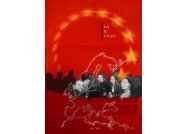turkish-greek civic dialogue - AEGEE Europe
turkish-greek civic dialogue - AEGEE Europe
turkish-greek civic dialogue - AEGEE Europe
Create successful ePaper yourself
Turn your PDF publications into a flip-book with our unique Google optimized e-Paper software.
If you read Greek history, its continuous historical enemy for centuries is<br />
automatically interpreted as the possible future enemy, as it is the case in<br />
Turkey. This system of paradigm - the system of thought of “national us”<br />
and “national Others” - is the present attitude in textbooks in all levels of<br />
historiography (In all Greek and in Turkish history textbooks without any<br />
exception in all literature, media, art, sport, in symbols and the names). In<br />
two days’ time in Greece, we have 25th of March, the national day of Greece,<br />
where we celebrate the liberation from Turkish rule. We talk about Greece<br />
and how we liberated ourselves. Three months later, the Turkish side will do<br />
the same and will celebrate how they liberated Turkey from Greece. Actually,<br />
I have the impression that the problem we are talking about is not between<br />
Greeks and Turks, but it’s within each country. We have this paradigm, which<br />
reproduce mistrust and fear. Therefore, my first conclusion is that there is the<br />
fear that exists and the second conclusion is all these factors that generate<br />
fear.<br />
If this diagnosis is relatively correct and justified to a certain extent, then we<br />
can avoid some assumptions, which we take for granted that people really<br />
want to change things. Because changing this paradigm - which is part of our<br />
identity- requires changing our concept about history. It’s clear that it’s not an<br />
easy process and a simple thing.<br />
What the nation-state did was to move the criteria of justice from international<br />
arena, from international concepts or humanitarian concepts into the local and<br />
national concepts. We judge things according to our criteria and our criteria<br />
that are not accepted on the other side. I turned on the TV this morning and<br />
watched the news about Iraq. I saw “the South” using the expression “Americans<br />
are invading Iraq” whereas “the North” says “Turkish army is entering Iraq”. At<br />
the moment, America is carrying out this operation by disregarding legitimacy<br />
and the United Nations, but the Turkish army is joining this operation based<br />
on a legitimate defense mentality of national interest. When nations confront<br />
each other, they use their own criteria being so satisfied with their own<br />
understanding and they disregard the understanding of “the Others”. They<br />
don’t even bother how “the Other side” is thinking, they don’t consider the<br />
Others’ motives, fears, their sensitivities.<br />
Therefore, I noticed how strangely we use the words. We talk about justice,<br />
history, problem; but whose problem? We talk about the sovereignty rights; but<br />
Association des Etats Généraux des Etudiants de L’<strong>Europe</strong><br />
whose rights? Why are we so happy when we have a military victory? What does<br />
it mean for “the Other side”? Unfortunately, we are approaching the problem<br />
from only one angel, one nationalistic angel, “our” angel, which disregards<br />
the existence and sensitiveness of “the Other”. There is also another national<br />
paradigm with information. What “we” write is information and what “we”<br />
read is information; what “the Others” write is “disinformation”.<br />
We need a new cultural approach, a change in the philosophy of looking<br />
at things. We need a new state of mind looking at things from a different<br />
perspective. Of course, this will automatically require a new identity, a new<br />
national identity and that is the most difficult part when people insist on the<br />
identity they are used to.<br />
We have a problem with the fact that, when NGOs getting help from abroad<br />
they are characterised as “agents”. NGOs should be independent; they bring<br />
along their views to the society. It’s not a problem that there are many NGOs<br />
with different views and approaches, negative and positive approaches. This<br />
creates even a bigger dynamic within a society when we have different views<br />
expressed. This will give people opportunity to choose.<br />
As a result of my efforts to understand what’s going on between Turkey and<br />
Greece, I ended up with one important conclusion in years: there are two sets<br />
of “Others” in Greek & Turkish thinking, discourse and literature. It’s “the<br />
Other”: for Greeks “the Other” is Turks, for Turks “the Other” is the Greeks.<br />
There are two types of “the Other”: The first type is the concrete one, the<br />
one you see, the one that comes to “our” country, the one we meet when<br />
we go to Greece and the one we communicate, we know his name and his<br />
profession. The other type is imaginary one, a historical one. We don’t know<br />
him actually, we just know him as a stereotype. The most striking examples are<br />
Ömer Seyfettin, Halide Edip, Yakup Kadri. These authors have written novels<br />
where they created imaginary Greek and the Greeks that they created are 99%<br />
negative. But once they wrote their memories, they wrote about the Greeks<br />
that they actually met and surprisingly, they are almost all positive. This is<br />
striking. This is what we see that repeating all the time in Greek and Turkish<br />
literature, in our daily life. We meet Greeks, they are all nice people. We<br />
have no problem with them, but we know that Greeks are problems to Turkey.<br />
Positive when it’s real, negative when it’s imaginary and stereotype. This<br />
actual positive and negative goes at the same time.<br />
Rebuilding Communication<br />
51







